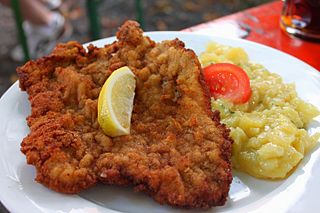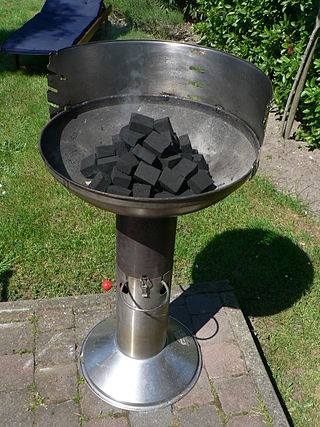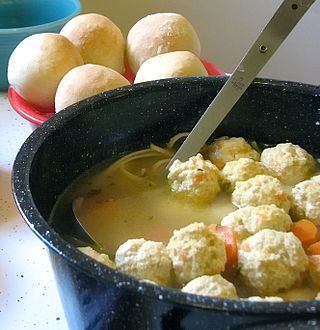Related Research Articles

Schnitzel is a thin slice of meat. The meat is usually thinned by pounding with a meat tenderizer. Most commonly, the meat is breaded before frying. Breaded schnitzel is popular in many countries and is made using veal, pork, chicken, mutton, beef, or turkey. Schnitzel originated as wiener schnitzel and is very similar to other breaded meat dishes.

Bulgarian cuisine is part of the cuisine of Southeast Europe, sharing characteristics with other Balkan cuisines. Bulgarian cooking traditions are diverse because of geographical factors such as climatic conditions suitable for a variety of vegetables, herbs, and fruit. Aside from the variety of local Bulgarian dishes, Bulgarian cuisine shares a number of dishes with its neighboring countries, in particular with Turkish and Greek cuisine.

Cypriot cuisine is the cuisine of the island of Cyprus, shared by both Greek Cypriots and Turkish Cypriots.

Levantine cuisine is the traditional cuisine of the Levant, in the sense of the rough area of former Ottoman Syria. The cuisine has similarities with Egyptian cuisine, North African cuisine and Ottoman cuisine. It is particularly known for its meze spreads of hot and cold dishes, most notably among them ful medames, hummus, tabbouleh and baba ghanoush, accompanied by bread.

Barbecue varies by the type of meat, sauce, rub, or other flavorings used, the point in barbecuing at which they are added, the role smoke plays, the equipment and fuel used, cooking temperature, and cooking time.

Israeli cuisine primarily comprises dishes brought from the Jewish diaspora, and has more recently been defined by the development of a notable fusion cuisine characterized by the mixing of Jewish cuisine and Arab cuisine. It also blends together the culinary traditions of the various diaspora groups, namely those of Middle Eastern Jews with roots in Southwest Asia and North Africa, Sephardi Jews from Iberia, and Ashkenazi Jews from Central and Eastern Europe.

Tunisian cuisine, the cuisine of Tunisia, consists of the cooking traditions, ingredients, recipes and techniques developed in Tunisia since antiquity. It is mainly a blend of Mediterranean and native Punics-Berber cuisine. Historically, Tunisian cuisine witnessed influence and exchanges with many cultures and nations like Italians, Andalusians, French and Arabs.

Neapolitan cuisine has ancient historical roots that date back to the Greco-Roman period, which was enriched over the centuries by the influence of the different cultures that controlled Naples and its kingdoms, such as that of Aragon and France.
The first season of the American reality competition show Top Chef Masters was broadcast on Bravo. It is a spin-off of Bravo's hit show Top Chef. In the first season, 24 world-renowned chefs competed against each other in weekly challenges. The program took place in Los Angeles. In the season finale that premiered on August 19, 2009, Rick Bayless was crowned Top Chef Master.

Venetian cuisine, from the city of Venice, Italy, or more widely from the region of Veneto, has a centuries-long history and differs significantly from other cuisines of northern Italy, and of neighbouring Austria and of Slavic countries, despite sharing some commonalities.
The second season of the American reality competition show Top Chef Masters was announced on October 22, 2009. In addition, it was announced that Gail Simmons would be added as a critic. The season premiered on April 7, 2010 with 22 chefs competing against each other in weekly challenges. In the season finale that premiered on June 9, 2010, Marcus Samuelsson was crowned Top Chef Master.

A meatball is ground meat (mince) rolled into a ball, sometimes along with other ingredients, such as bread crumbs, minced onion, eggs, butter, and seasoning. Meatballs are cooked by frying, baking, steaming, or braising in sauce. There are many types of meatballs using different types of meats and spices. The term is sometimes extended to meatless versions based on legumes, vegetables or fish; the latter are also commonly known as fish balls.
References
- ↑ "Episode List for Joanne Weir's Cooking Class Television Show". Archived from the original on January 2, 2007. Retrieved January 11, 2009.
- ↑ "Cooking Classes on DVD" . Retrieved January 11, 2009.